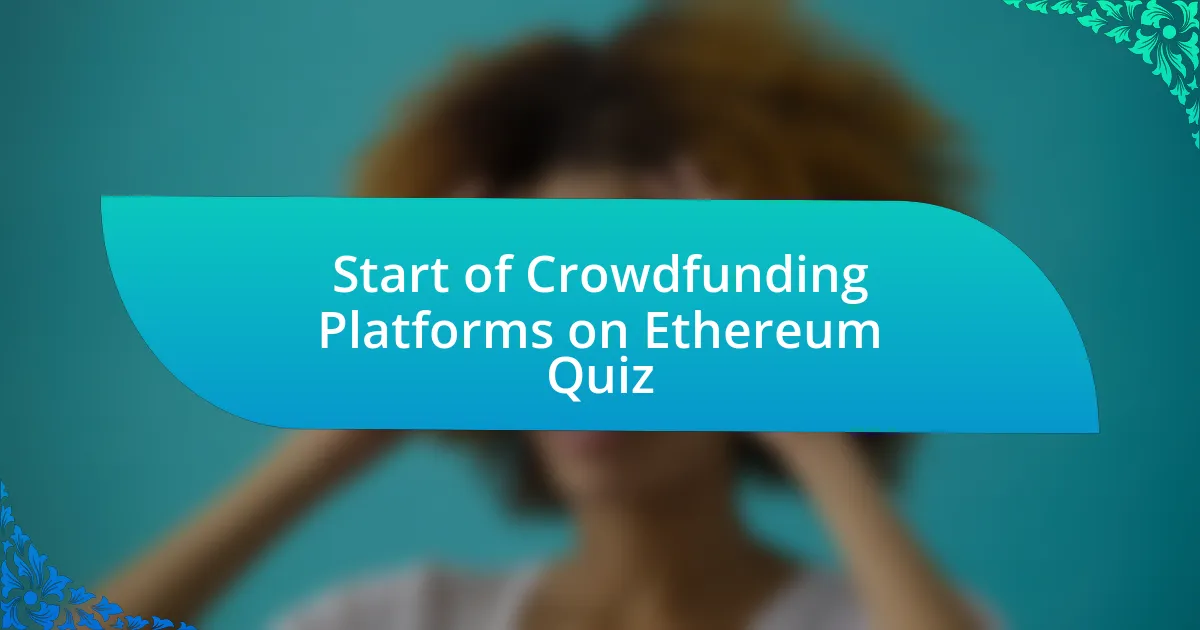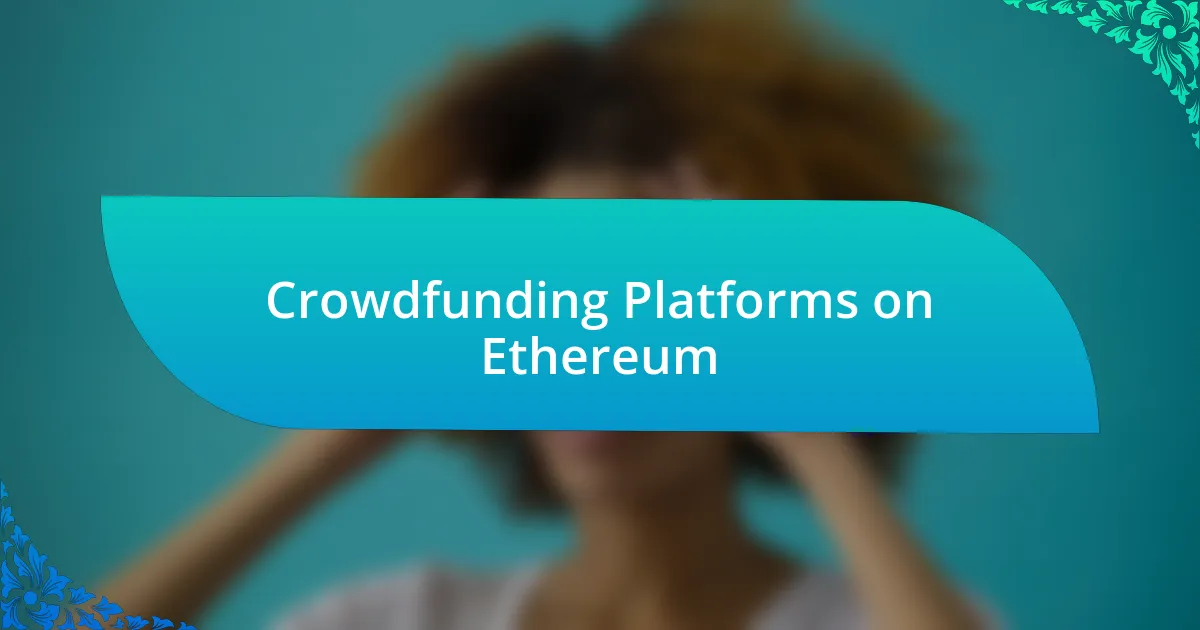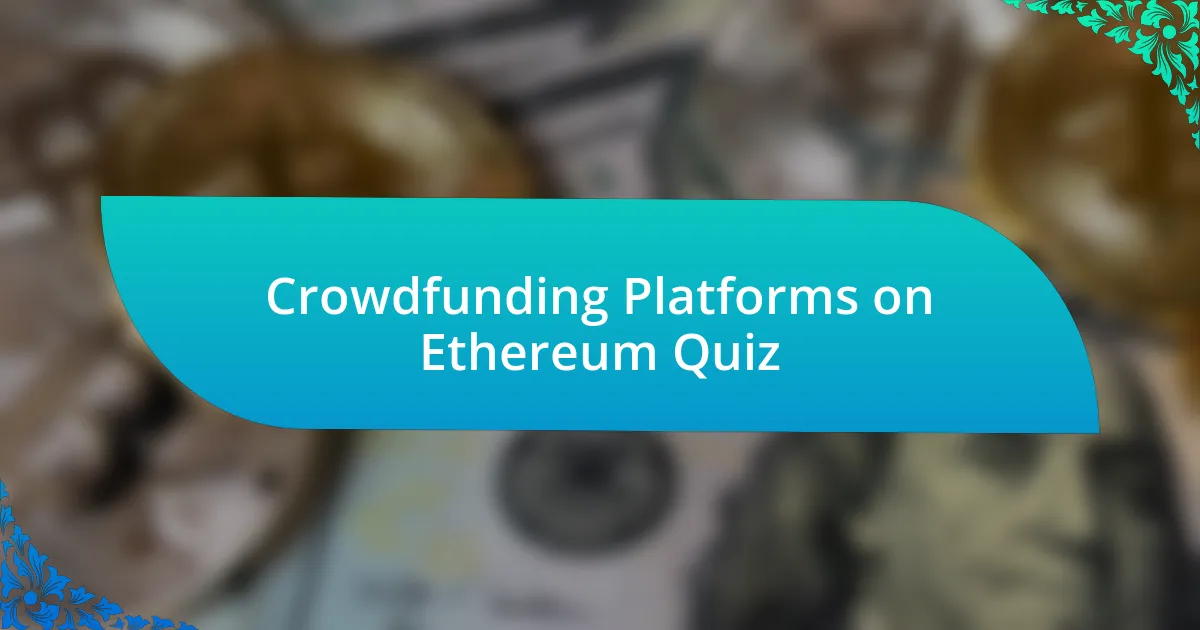
Start of Crowdfunding Platforms on Ethereum Quiz
1. What is the primary function of Juicebox in the context of crowdfunding?
- Juicebox is a platform for selling consumer goods directly to customers.
- Juicebox is an all-in-one crowdfunding tool with powerful treasury management and redemptions, built for Ethereum.
- Juicebox focuses primarily on social media marketing for fundraising.
- Juicebox only supports fiat currencies and traditional payment methods.
2. Which platform tokenizes physical assets and breaks them down into component parts for purchase?
- Coinstarter
- RealBlocks
- Indiegogo
- GitCoin
3. What is the name of the platform that uses blockchain technology to enable institutional and retail investors to invest in real estate?
- Coinstarter
- WeFunder
- RealBlocks
- Meridian
4. Which platform has partnered with Coinbase to allow creators to receive funding in Bitcoin?
- Patreon
- Indiegogo
- Fundly
- GoFundMe
5. What is the name of the platform that offers various features like fundraising, tipping, hackathons, and project search functions?
- FundRaiser
- GitCoin
- ProjectHub
- CryptoAid
6. How much money has GitCoin raised?
- GitCoin has raised $12.4 million.
- GitCoin has raised $34.6 million.
- GitCoin has raised $51.8 million.
- GitCoin has raised $78.9 million.
7. What is the primary focus of GitCoin?
- GitCoin primarily focuses on social media marketing for businesses.
- GitCoin primarily focuses on supporting open-source Web3 projects.
- GitCoin primarily focuses on traditional crowdfunding for startups.
- GitCoin primarily focuses on selling physical products online.
8. What is the name of the platform that facilitates the exchange of digital assets, patents, and intellectual property rights?
- Pixel Vault
- Blockfolio
- Crypto Bazaar
- Tecra Space
9. What is the name of the platform that allows developers to list projects based on patents, digital assets, and intellectual property rights?
- PatentVault
- Tecra Space
- AssetLink
- CryptoZone
10. How does Juicebox manage funds?
- Juicebox requires users to invest a minimum of $1,000.
- Juicebox only accepts fiat currency for funding.
- Juicebox allows users to get paid in ETH and program their own payouts, token issuance, and redemptions.
- Juicebox prevents users from managing their own payouts.
11. What is the benefit of using Juicebox for project creators?
- Juicebox provides a fixed funding rate for every project.
- Juicebox is non-custodial, meaning project creators have complete ownership over their project and its funds.
- Juicebox restricts the number of supporters a project can have.
- Juicebox charges high fees for every transaction made.
12. What is the primary standard used by Juicebox for governance?
- Juicebox uses simple standards and works with all of your favorite Ethereum tools.
- Juicebox implements strict legal compliance measures.
- Juicebox follows complex regulations for fundraising.
- Juicebox is governed by a centralized authority.
13. How many projects have raised over 50,000 ETH using Juicebox?
- More than 2,500 projects have raised over 50,000 ETH using Juicebox.
- About 500 projects have raised over 50,000 ETH using Juicebox.
- Exactly 750 projects have raised over 50,000 ETH using Juicebox.
- Over 1,000 projects have raised over 50,000 ETH using Juicebox.
14. What is the minimum cost to launch a project on Juicebox?
- $50 subscription charge.
- $100 minimum fee.
- Free, with only gas fees required.
- $10,000 investment requirement.
15. What is the primary benefit of using Juicebox for community growth?
- Juicebox offers high-interest savings accounts for contributors.
- Juicebox allows users to issue tokens or NFTs to their supporters and use them for governance, token-gated websites, or redemptions.
- Juicebox provides instant loans for project creators without collateral.
- Juicebox facilitates direct selling of physical products to supporters.
16. What is the name of the platform that is known for its simplicity and ability to raise more money through intermediaries and institutional channels?
- RealBlocks
- GitCoin
- KickStarter
- Indiegogo
17. What is the name of the platform that offers a marketplace for innovative products and has a global network of early adopters?
- Kickstarter
- GoFundMe
- Crowdfunder
- Indiegogo
18. What is the primary function of GitCoin Grants rounds?
- GitCoin Grants rounds enable investors to contribute to projects and technologies during quarterly funding rounds.
- GitCoin Grants rounds allow for direct purchases of digital assets.
- GitCoin Grants rounds are used to sell physical products to consumers.
- GitCoin Grants rounds facilitate loan agreements for startups.
19. What is the name of the platform that supports over 50,000 platforms and has raised about $5 billion for several projects?
- Kickstarter
- GitCoin
- Indiegogo
- WeFunder
20. What is the name of the platform that is primarily focused on supporting open-source Web3 projects?
- GitCoin
- Coinstarter
- Indiegogo
- Kickstarter
21. What is the name of the platform that allows users to receive donations directly to their private nodes?
- DonateChain
- TallyCoin
- BitFund
- Fundify
22. What is the name of the platform that is known to help provide opportunities for tokenization?
- Meridian
- Tecra Space
- WeFunder
- Coinstarter
23. What is the primary benefit of using Tecra Space for project creators?
- Tecra Space provides a social media platform for project creators.
- Tecra Space offers various tokenisation options for project creators.
- Tecra Space only supports crowdfunding for tech startups.
- Tecra Space focuses solely on real estate investments.
24. What is the name of the platform that is considered one of the earliest crypto crowdfunding platforms to adopt and accept Bitcoin?
- WeFunder
- StartSomeGood
- Fundable
- CrowdFunder
25. What is the minimum investment required to start an investment on WeFunder?
- The minimum investment required is $100.
- The minimum investment required is $200.
- The minimum investment required is $500.
- The minimum investment required is $50.
26. What is the name of the platform that is known for its decentralized feature and direct interaction with property owners without third-party involvement?
- Meridian
- StartSomeGood
- Crowdfunder
- Fundly
27. What is the name of the platform that is primarily focused on real estate investment and tokenizes physical assets?
- Coinstarter
- Indiegogo
- Meridian
- WeFunder
28. What is the name of the platform that charges a monthly subscription fee and a separate transaction fee?
- Coinstarter
- Indiegogo
- WeFunder
- TallyCoin
29. What is the name of the platform that supports over 50,000 platforms and has a dedicated support team?
- Indiegogo
- Kickstarter
- RealBlocks
- GitCoin
30. What is the name of the platform that has raised over $1 billion for over 800,000 projects?
- Indiegogo
- GitCoin
- WeFunder
- Kickstarter

Congratulations, You’ve Completed the Quiz!
Thank you for participating in our quiz on Crowdfunding Platforms on Ethereum. We hope you found the experience enjoyable and informative. Quizzes like this not only test your knowledge but also enhance your understanding of how Ethereum can revolutionize fundraising. You may have learned about the fundamentals of crowdfunding, the benefits of blockchain technology, and the various platforms available today.
As you navigated through the questions, you likely discovered key concepts surrounding the mechanics of Ethereum crowdfunding. This includes smart contracts, project transparency, and security features that make crowdfunding more reliable. Understanding these aspects is crucial for anyone interested in participating in or launching a crowdfunding campaign.
We invite you to explore our next section on this page, where you will find more in-depth information about Crowdfunding Platforms on Ethereum. This resource will enrich your knowledge and provide insights into real-world applications, successful projects, and future trends. Dive deeper into this exciting topic and broaden your perspective on this innovative funding model!

Crowdfunding Platforms on Ethereum
Overview of Crowdfunding Platforms on Ethereum
Crowdfunding platforms on Ethereum utilize blockchain technology to facilitate fundraising for various projects. These platforms enable creators to raise capital directly from supporters without intermediaries. By leveraging Ethereum’s smart contracts, transactions are transparent and secure. Creators can set funding goals, timelines, and usage terms for the raised funds. As a result, contributors can see how their funds are used, leading to increased trust between parties.
Benefits of Using Ethereum for Crowdfunding
Utilizing Ethereum for crowdfunding offers several advantages. Firstly, it ensures decentralization, meaning there is no central authority controlling funds. Secondly, the transparency of blockchain allows backers to track financial movements. Thirdly, global access enables projects to reach potential supporters from anywhere in the world. Additionally, lower transaction fees compared to traditional methods can maximize funds received by creators, enhancing project viability.
Types of Crowdfunding Models on Ethereum
Different crowdfunding models exist on Ethereum, catering to various needs. The most common types include donation-based, reward-based, and equity crowdfunding. In donation-based crowdfunding, backers contribute without expecting financial returns. Reward-based models offer tangible rewards or incentives in exchange for funding. Equity crowdfunding allows backers to receive shares or ownership stakes in the funded project, aligning interests between creators and supporters.
Notable Crowdfunding Platforms on Ethereum
Several reputable crowdfunding platforms operate on the Ethereum network. Examples include Kickstarter, which has integrated blockchain technology for transparency, and Gitcoin, focused on funding open-source projects. DAOstack also enables decentralized autonomous organizations to fund community-driven projects. Each platform has unique features, targeting specific audiences and project types while harnessing Ethereum’s capabilities.
Challenges Faced by Crowdfunding Platforms on Ethereum
Crowdfunding platforms on Ethereum encounter various challenges. Regulatory compliance is a significant hurdle, as differing laws govern crowdfunding in different regions. Market volatility also poses risks, as funds raised in cryptocurrencies can fluctuate significantly. Additionally, user adoption remains a challenge, as potential backers may be unfamiliar with blockchain technology. These factors can impact the success and growth of crowdfunding initiatives on Ethereum.
What are Crowdfunding Platforms on Ethereum?
Crowdfunding platforms on Ethereum are decentralized applications (dApps) that facilitate raising funds from multiple contributors using smart contracts on the Ethereum blockchain. They enable project creators to set funding goals and timeframes, allowing backers to contribute Ether or tokens. Known examples include platforms like Golem and Cindicator, which leverage Ethereum’s capabilities to streamline fundraising while ensuring transparency and security through blockchain technology.
How do Crowdfunding Platforms on Ethereum work?
Crowdfunding platforms on Ethereum operate by utilizing smart contracts to manage contributions, fund allocation, and distribution of rewards. Project creators deploy a smart contract that defines the terms of the crowdfunding campaign, such as the funding goal and deadline. As contributors send Ether, the smart contract automatically tracks these contributions and, upon reaching the goal, releases funds to the project creator. If the goal is not met, funds are refunded to contributors. This mechanism ensures trust and reduces the need for intermediaries.
Where can you find Crowdfunding Platforms on Ethereum?
Crowdfunding platforms on Ethereum can be found on various decentralized finance (DeFi) websites and marketplaces that focus on blockchain projects. Platforms such as Kickstarter for blockchain projects include Gitcoin and FundClause. Additionally, browsing Ethereum dApps directories like State of the dApps can help locate specific crowdfunding dApps operating on the Ethereum network.
When did Crowdfunding Platforms on Ethereum become popular?
Crowdfunding platforms on Ethereum gained popularity around 2016, coinciding with the Initial Coin Offering (ICO) boom. This era marked a significant rise in startups using Ethereum-based crowdfunding to raise capital. The success of notable ICOs, such as the Ethereum project itself, demonstrated the potential of crowdfunding on this blockchain. As of 2021, regulatory scrutiny has further shaped the landscape and usage of these platforms.
Who uses Crowdfunding Platforms on Ethereum?
Crowdfunding platforms on Ethereum are primarily used by startups, entrepreneurs, and project creators seeking to raise capital. They are particularly popular in the tech and blockchain sectors, where innovative projects leverage their decentralized nature to reach a global audience of potential backers. Investors and crypto enthusiasts participate as backers, looking to support projects they believe in while potentially earning returns through early access or tokens.

